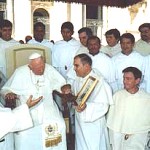
One of my favorite lines from Fr. John Hardon, the late, great Jesuit theologian whose cause for sainthood is working its way through the Church, is: “even a corpse can float downstream.”
Yet, as Saint Irenaeus famously said, “The glory of God is man fully alive!” If we are fully alive in Christ, then we have the vitality to swim against the current, to work against the pull of the flesh that wants to drag us downstream. And there is no neutrality here: if we do nothing but “go with the flow,” then we will be dragged along with those who have made a conscious decision in favor of the “flesh” as opposed to the lifegiving “spirit.”
Those who are faithfully answering the radical call to the consecrated life are the most “alive” people I’ve ever encountered. A few months ago my wife Maureen and I had the privilege of visiting with our daughter at the motherhouse of the Dominican Sisters of Mary, Mother of the Eucharist, in Ann Arbor, Michigan. What struck me even more than the calls to chastity and obedience was the way they live the call to poverty.
Like the woman in the Gospel who was healed of her infirmity and was able to stand upright for the first time in many years, these beautiful young ladies are not “bent over” and worried about things here below. Rather, with Our Lord as their strength and constant companion, they see things from a more God-centered perspective. They are free. They appreciate and enjoy everything. They are not bored or thinking about what they’ve “given up” or don’t have. What an amazing paradox: By becoming poor, they have truly become rich!
I’m particularly drawn to Eucharistic Prayer III. One phrase from that prayer that has had rich meaning for me through the years is, “Father, hear the prayers of the family you have gathered here . . .” as I’ve written frequently on the image of the Church as the “family of God” as well as on the “parish family.”
But at Mass the week Sr. Mary Kate entered the Dominicans, it was the next line that really struck me: “In mercy and love unite all your children wherever they may be.”
Even though Sr. Mary Kate is now a thousand miles away, we are still united in God’s mercy and love, particularly through our participation in the Eucharist and in the life of the Church in general (a “communion of saints” thing). This is another one of those teachings to which we give notional assent, but every now and then we have moments in which a truth of the faith penetrates us in a more real, experiential way.
It’s all right here in the Catechism of the Catholic Church (nos. 2232-33):
“Family ties are important but not absolute. Just as the child grows to maturity and human and spiritual autonomy, so his unique vocation which comes from God asserts itself more clearly and forcefully. Parents should respect this call and encourage their children to follow it. They must be convinced that the first vocation of the Christian is to follow Jesus: ‘He who loves father or mother more than Me is not worthy of Me; and he who loves son or daughter more than Me is not worthy of Me’ (Mt 10:37). . . .
“Parents should welcome and respect with joy and thanksgiving the Lord’s call to one of their children to follow Him in virginity for the sake of the Kingdom in the consecrated life or in priestly ministry.”
This brings me back to the call to poverty. Young religious need to incorporate a healthy spirit of detachment from worldly things, including even one’s family, if they are to be “worthy” disciples of Christ. This assuredly means swimming upstream, and I was so impressed with how well the young sisters seemed to be making this transition, despite the inherent difficulty.
It’s also a challenge for parents to have their son or daughter enter religious life, especially when they enter right out of high school. We had about as much advance warning as possible (Sr. Mary Kate told me when she was 5 that she wanted to be a nun), and it was still a shock to the system.
I think that letting go of a child who is entering religious life is an act of poverty on our part. We not only are creating “space” for our children to seek evangelical perfection, but also growing in our own feeble spirit of sacrifice and detachment. Not surprisingly, Maureen and I have become fast friends with a whole fraternity of families who are also going through the same process.
Please remember in your prayers for religious vocations those who have already responded and, like Sr. Mary Kate, are going through the initial stages of their formation. And while you’re at it, please pray for their families, too!
This article originally appeared in the January/February 2011 issue of Religious Life, the bimonthly magazine of the Institute on Religious Life.
 In
In  Last week, the Vatican released Pope Benedict XVI’s message for the 48th World Day of Prayer for Vocations, which will be celebrated later this spring. The entire message, entitled “Proposing Vocations in the Local Church,” may be accessed
Last week, the Vatican released Pope Benedict XVI’s message for the 48th World Day of Prayer for Vocations, which will be celebrated later this spring. The entire message, entitled “Proposing Vocations in the Local Church,” may be accessed  Very few of us will walk up to someone today and greet him or her with the words, “Happy St. Cyril’s Day,” or even “Happy Cyril’s Day.” And surely no one will tell their sweetheart to “Be my Methodius.”
Very few of us will walk up to someone today and greet him or her with the words, “Happy St. Cyril’s Day,” or even “Happy Cyril’s Day.” And surely no one will tell their sweetheart to “Be my Methodius.”

 The current issue of the Homiletic and Pastoral Review has an outstanding article by Fr. Damien Ference entitled,
The current issue of the Homiletic and Pastoral Review has an outstanding article by Fr. Damien Ference entitled, 
 What do we know about the women religious in the United States who made their final vows this past year?
What do we know about the women religious in the United States who made their final vows this past year? Pope Benedict XVI devoted his weekly general audience last Wednesday to St. Teresa of Avila (1515-82), one of the most revered spiritual guides in the history of the Church.
Pope Benedict XVI devoted his weekly general audience last Wednesday to St. Teresa of Avila (1515-82), one of the most revered spiritual guides in the history of the Church.  At the conclusion of his general audience this past Wednesday, Pope Benedict XVI recalled that February 2nd was also
At the conclusion of his general audience this past Wednesday, Pope Benedict XVI recalled that February 2nd was also